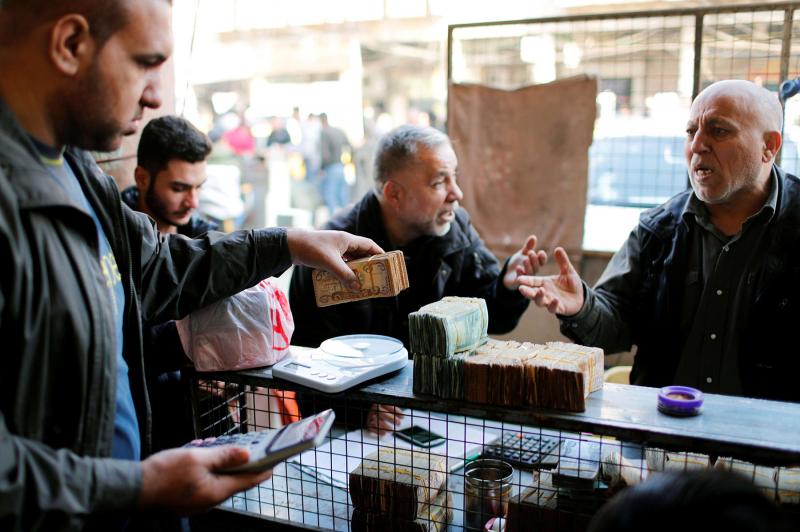Although essentially economic and financial in nature, the Iraqi government’s decision to devalue the Iraqi dinar against the US dollar has had political and strategic implications for Iran and its militias in Iraq and the region.
The unresponsive reaction of the black market to the government's decision revealed that Iraqi Prime Minister Mustafa al-Kadhimi has actually dealt a major economic blow to Iran's allies in Iraq at a sensitive moment.
The Baghdad government reduced the exchange rate of the local currency so that every US dollar would be sold for 1,450 dinars instead of 1,119 in order to face an unprecedented cash liquidity crisis due to low oil prices and the effects of the COVID-19 pandemic.
The old rate of the Iraqi dinar created a wide margin for speculation with the dollar at home and for smuggling of the US currency to Iran by armed militias that have at their disposal private banks and merchants linked to pro-Iran Shia parties.
The figures that were made available in the days after the exchange rate was changed revealed shocking facts -- that about 80% of the hard currency that was pumped by Iraq's Central Bank to maintain a fixed exchange rate is being smuggled into Iran and Syria after being exchanged in urgent speculation inside Iraq.
Iraqi MP Mohamed al-Darraji said that the Central Bank's selling of dollars to banks, companies and merchants decreased significantly after hiking up the exchange rate, which confirms that the dollar was being smuggled out of the country.
He explained that over the past ten years, the Central Bank had sold private banks, companies and merchants about $200 million a day, which supposedly covered the cost of Iraq’s internal needs imported from abroad.
However, over the past two days, the Central Bank sold only $35 million at the new exchange rate, which confirms that the remainder of the $200 million that was pumped into the market every day was being smuggled out of Iraq.
Economists say that Iran has dealt with Iraq over the past ten years as a bank to revive its economy and finance its wars in Syria and Yemen.
Smuggled Iraqi money is used to finance weapons purchases disguised as other material.
Iraqi sources say that Iran has spent billions of dollars, after smuggling them out of Iraq, to buy Chinese weapons and smuggle them into Syria, Yemen and Lebanon in recent years.
All of these funds came from Iraq's Central Bank, which was pumping dollars to maintain the old exchange rate of 1,119 dinars per dollar.
But with the change in the exchange rate, dollars coming from Iraq have become expensive and are no longer profitable. For speculation purposes, the demand for dollars sold by Iraq's Central Bank has plunged, as the dollar is still being traded on the black market at prices lower than the government level.
In the end, Iran may have lost an influential financial cover that Iraq was providing to sustain the process of supplying arms to its proxies in Syria and Yemen, while its militias, parties and fronts in Iraq lost a very important source of revenue that was sufficient to sustain their political activities.
As soon as Iran made sure it would pay the price of changing the Iraqi dinar exchange rate against the dollar, it stopped supplying Iraq with the gas it needed to operate the electric power stations, which caused the collapse of the national electricity system.
Ahmad Musa, a spokesman for Iraq's electricity ministry, said that Iran had reduced the amount of gas exported to Iraq per day from 50 million cubic metres to three million cubic meters, explaining that the national electricity system can now supply citizens with only one hour of electricity followed by five hours of blackout.
Iran claims that it has reduced the quantity of gas exported to Iraq due to the accumulation of unpaid Iraqi debt, although bilateral debt between the two countries in various sectors has never halted economic exchange before.
Government sources say that Iran is trying to punish Iraq for changing the exchange rate of its currency by implicating it in an electricity crisis that may ignite street anger against the government.
Observers say that Kadhimi’s success in passing this test may reflect on the course of the confrontation between the government and the militias affiliated with Iran, which is believed to be in its most dangerous phase.
Source (Click Here)


 RSS Feed
RSS Feed